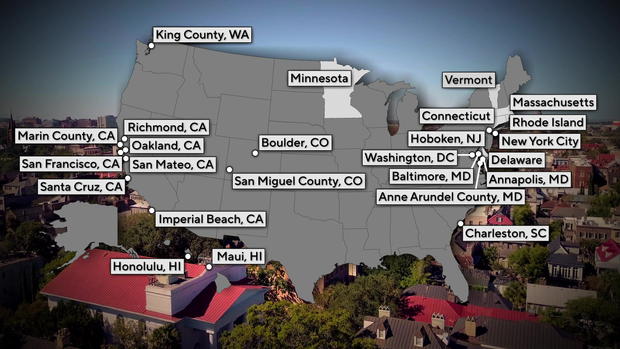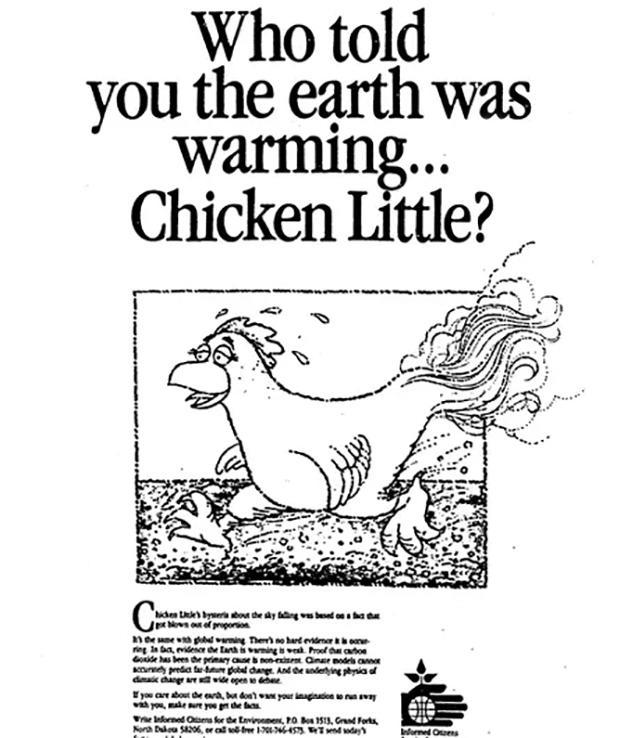Suing over climate change: Taking fossil fuel companies to court
If climate change were a disaster film, it would likely be accused of being too over-the-top: wildfires reducing entire towns to ashes, hurricanes swamping cities, droughts draining lakes and withering fields, and raging oceans redrawing the very maps of our coasts. And now, many cities and states are asking, who's going to pay for all of this?
"This is real; we're on the front line of climate change right here in Charleston," said John Tecklenburg, the mayor of Charleston, South Carolina. The city's been battered by an endless parade of floods due to sea level rise. Some desperate homeowners have resorted to raising their homes by several feet.
"In the next 50 years we'll see another two to three feet of sea level rise," Tecklenburg said. "The water is our greatest asset; it has also become our biggest challenge."
So, the city is raising large parts of its existing sea wall, and the Army Corps of Engineers says Charleston should build another eight miles of wall. The city expects an estimated $3 billion in climate change-related costs.
Correspondent Ben Tracy asked, "Can you raise taxes high enough to cover these costs?"
"It's like any big project; you gotta look under every rock," Tecklenburg replied.
Underneath one of those rocks are the fossil fuel companies. Study after study has shown the companies' carbon emissions from oil, coal and gas are major contributors to climate change.
Charleston is one of more than two dozen cities, counties and states that are suing these companies (including ExxonMobil, Shell, Chevron, BP and ConocoPhillips).
Tecklenburg said, "I feel if you've contributed to the problem, that you should contribute to the solution."
"So, in some ways, it is a bit of a money grab?" asked Tracy.
"Well, to the extent that they participated in what created this need; it's a money grab because there's some responsibility for what happened."
The suits are modeled after the "Big Tobacco" cases of the 1990s, and accuse the companies and industry groups of making false and misleading claims about climate change.
William Tong, attorney general of Connecticut, said, "I'm suing ExxonMobil because they lied to us."
Tong is suing ExxonMobil under the state's consumer protection laws. He said internal company research done by Exxon and Mobil (which used to be separate companies) shows they were aware of the dangers of climate change since at least the 1980s.
"There's a study from, I think, 1982 in which they produce a chart that shows, as the levels of carbon dioxide rise, the temperature of our atmosphere will rise," said Tong. "And that chart is almost exactly right."
And the suit also cites a 1988 internal draft memo from an Exxon spokesperson advising the company "emphasize the uncertainty" of climate science.
"This is a strategy document from ExxonMobil that basically says, 'Let's lie. Let's say the science is not clear. Let's downplay the fact of climate change,'" Tong said.
He points to ads that look like editorials from ExxonMobil, as well as their executives' own words, including the 1996 statement by Lee Raymond (then the CEO of Exxon) that "the scientific evidence remains inconclusive as to whether human activities affect the global climate."
Tracy asked, "Some of these internal memos from the company acknowledge uncertainty about this. Does that strengthen the company's argument that this was not settled science?"
"No, it doesn't," Tong replied. "Because the fact is, that they knew with a fair degree of certainty that there could be serious catastrophic effects from the continued use of fossil fuels. The fact that scientists have questions about their data is unremarkable; that's what scientists do."
"So, your argument is, even if they didn't know everything, they knew enough?"
"That's right."
ExxonMobil, which is named in all 24 of these lawsuits, says, "The claims are baseless and without merit."
In total, the cases accuse more than 40 fossil fuel companies of a disinformation campaign.
Some point to a 1992 video, backed primarily by the coal industry, promoting the benefits of pumping more carbon dioxide into the atmosphere. In it, Dr. Sherwood Idso states, "A doubling of the CO2 content of the atmosphere will produce a tremendous greening of Planet Earth."
And an on-camera host declares, "As more and more scientists are confirming, our world is deficient in carbon dioxide."
To watch "The Greening of Planet Earth," a 1992 video produced by the Western Fuels Association, click on the player below:
"CBS Sunday Morning" reached out to several of the companies. Some responded, writing they are working to combat climate change. In addition, ExxonMobil and Shell said these lawsuits do nothing to advance that goal.
Phil Goldberg, an attorney with the Manufacturers' Accountability Project (a group helping the fossil fuel industry push back against these lawsuits), told Tracy, "Fighting climate change requires policymaking, not lawsuits."
Tracy asked, "The attorneys in some of these cases, though, would say that what they're doing is trying to hold these companies liable for deception. Is that fair?"
"This is not an issue of who knew what or when, or who said what and when," Goldberg replied. "The federal government has had the very same information that they're saying that the energy companies had going back to the 1960s and '70s and '80s. The question is, what we're gonna do about it today?"
Richard Lazarus, who teaches environmental law at Harvard, said, "The scope of the problem is one that requires really a national approach. Cities and counties and states are being the ones left with the problem when the federal government doesn't step up to the plate."
Lazarus said even if the cities and states prove the fossil fuel companies deceived the public about climate change, it doesn't necessarily mean they will win: "They've done a really good job of showing that the oil and gas industry, I think, engaged in fraudulent activity. The challenge will be causation, to prove that their fraudulent behavior is what prevented the United States from passing the laws we needed to reduce those greenhouse gas emissions."
So far, the industry has filed a series of motions, slowing down the cases.
Charleston, South Carolina is bracing for a long and uncertain legal battle. Tracy asked Mayor John Tecklenburg, "If you're not successful with this lawsuit, what does that mean for what you're trying to do here?"
"We're gonna find a way to fund the improvements that we need," he replied.
"But I bet you've heard the phrase, 'Hope is not a strategy'?"
Tecklenburg laughed: "Hope springs eternal, right?"
But in the meantime, the water keeps rising.
READ AN EXCERPT: "The Rule of Five," on arguing climate change before the Supreme Court
For more info:
- Mayor John Tecklenburg, Charleston, South Carolina
- William Tong, Attorney General of Connecticut
- Manufacturers' Accountability Project
- "The Rule of Five: Making Climate History at the Supreme Court" by Richard J. Lazarus (Harvard University Press), in Hardcover, Trade Paperback and eBook formats, available via Amazon and Indiebound
- Richard Lazarus, Harvard Law School
Story produced by Dustin Stephens. Editor: Ed Givnish.






